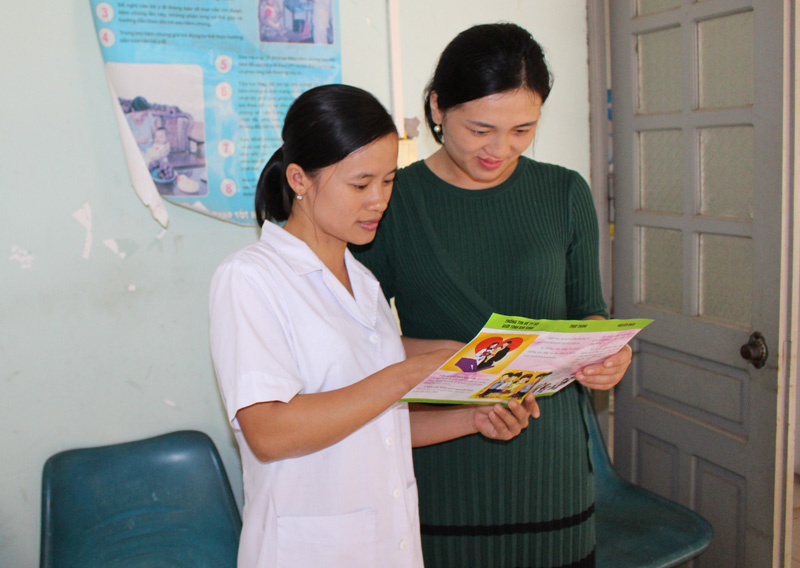
(HBO) – Authorities of Mai Ha commune in Mai Chau district consider improving population quality as a prerequisite for the locality’s socio-economic development. Therefore, thanks to an array of solutions, local population quality has gradually been improved.

A population-family planning worker gives information to
local residents.
Firstly, Mai Ha commune has stepped up the dissemination
of information to each family and resident. The board for population and family
planning has coordinated with associations to raise public awareness of each
collective and individual’s role in implementing population policies, the
importance of prenatal and newborn screening, adolescent reproductive health,
and the care for the elderly. Locals have also accessed information about
solutions to reduce the thalassemia incidence, the impact of gender selection,
and consequences of child marriages.
Ngan Thu Thuy, a population-family planning
worker, said in Mai Ha commune, the pre-marriage and thalassemia clubs have
proved effective. The three pre-marriage clubs, chaired by the Secretary of the
commune’s Ho Chi Minh Communist Youth Union, have updated youngsters and
students about the Law on Marriage and Family and knowledge about adolescent
reproductive health.
Meanwhile, the thalassemia club has called for
public support for the six-year-old Vi Bao Tran in Lau hamlet – the only
thalassemia case in Mai Ha commune. Tran has to receive blood transfusion once
a month amid difficulties facing her family. Thanks to the assistance from the
club and neighbours, her health has become stable.
The commune has also effectively carried out
plans on prenatal and newborn screening, minimising gender imbalance at birth,
and mobilising the public’s participation in contraceptive method provision.
As a result, 90 percent of local pregnant women
have received check-ups and tetanus vaccines, while all of them have received
HIV-related advices and tests. People have become more active in buying birth
control methods, instead of only receiving free support./.
More than just an information technology teacher, Bui Van Nien is an inspiring figure who has nurtured the scientific curiosity and creative spirit of students in Vietnam’s ethnic minority communities.
Da Bac is the most disadvantaged mountainous district in Hoa Binh province, with ethnic minorities accounting for about 90% of its population. Over the past years, the district has mobilised resources to implement ethnic policies to improve the quality of life of local people.
In recent years, Hoa Binh province has consistently prioritised the protection, care, and education of children, particularly those from ethnic minorities and disadvantaged backgrounds, by creating a safe, healthy, and nurturing environment for their all-round development.
The Steering Committee for Tobacco Harm Prevention and Control of Hoa Binh province, in coordination with the Tobacco Harm Prevention and Control Fund, held a ceremony on May 28 in response to the World No Tobacco Day (May 31) and the National No Tobacco Week (from May 25 to 31). The event was chaired by Nguyen Van Toan, Standing Vice Chairman of the provincial People’s Committee and head of the Steering Committee.
Since 2021, the Center for Industrial Promotion and Industrial Development Consulting (CIIDC) under the Department of Industry and Trade has been implementing a school lighting model as part of the plan for using energy efficiently and economically in Hoa Binh Province in the pẻiod of 2021 - 2025. This model not only aims to improve the learning conditions and enhance the education quality, but it also promotes the message of energy saving, energy security, environmental protection and contributes to the goals of socio-economic development.
In the 2024 - 2025 school year, the entire Hoa Binh provincial education sector includes 520 educational institutions and schools. Among them are 13 ethnic boarding schools with 153 classes and 4,487 students. Four of these schools have met national standards, reaching 30.7 percent.



